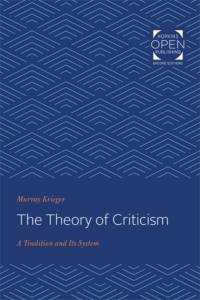Über The Theory of Criticism
Representing years of critical reflection, The Theory of Criticism attempts to construct a poetics of "presence." Within a wide range of critical terminology, Murray Krieger has sought to create a new vision. In language that is passionate and often dramatic, he looks at the multidimensionality of the poetic world through the lens of Western poetics. His work clearly addresses itself to post-New Critical questions: how to preserve the literary object as a thing to be perceived, valued, and enjoyed and yet to account for its presence in, and interaction with, our culture as a whole, always in danger of being dissolved into man's language-making and -forming activity in general. Our awareness of the poem as object must be modified by our awareness that it is an "intentional" object. Krieger develops his balanced vision in three parts. The first part defines the problem and defends the very activity of theorizing both in its own terms and in terms of the critic's function throughout the history of Western criticism. By asking at the outset whether criticism is vain or valuable, Krieger already confronts the basic tension between system and world and the need to account for both. By creating a heuristic system that examines the possibility of form, the critic serves also the world of history and thought as a whole. The second part pursues that history from the classical encounter with mimesis in Greek thought to the Romantic and post-Romantic elevation of consciousness as a main criterion of poetic art. Defining a "humanistic aesthetic" as it has been viewed since Aristotle, the author shows how, during and after the eighteenth century, form was opened up under the impact of a Kantian and post-Kantian view, epitomized finally by Coleridge's imagination and its consequences for recent theorists. The third part deals with the image of the world struggling against its enclosure within a poetic context. It expands our view of metaphor as a reflection of the dual nature of poetic language, simultaneously locked into the poem and referring to history and nature outside. Our reading of the poem, Krieger concludes, must be double: we must see the poem as a linear and chronological sequence reflecting real life, and we must read it as a circular, imitative, mutually implicative mode.
Mehr anzeigen

